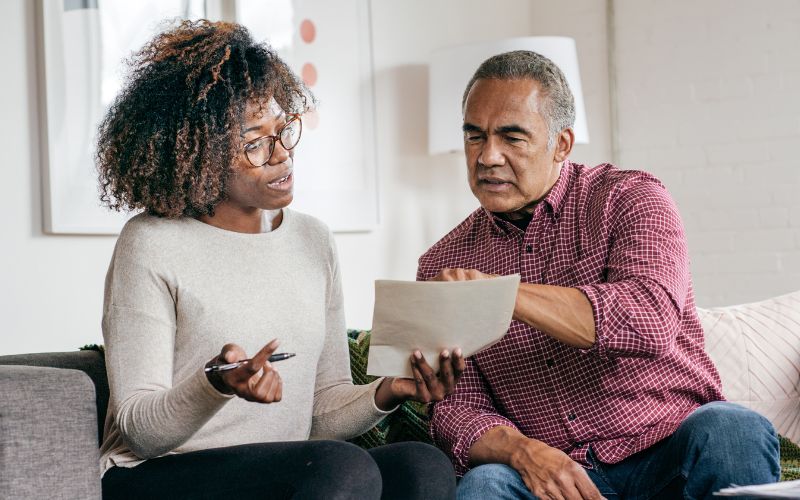Writing a Will: Important Questions

It can be difficult to know when to make a Will. Do you need to do it at a certain age? Do you need to wait for an appropriate time in life, such as when you get married or have kids?
Other questions might present themselves, such as whether you can skip the solicitor and do your own Will. After all, solicitors can be expensive.
Or maybe you’ve found yourself wondering what would happen if you don’t make one at all.
When should you write or rewrite your Will?
Most people who write a Will are over 50, but you don’t have to wait until that age. In fact, anyone can write one as soon as they turn 18, presenting you with plenty of opportunities throughout life.
Buying a home
When you buy a home, the value of your estate will change. So you may want to revise how much you are leaving to beneficiaries, or who you want the property to go to once you die.
It is worth noting what would happen if you own a home with someone else. If you are a joint tenant, full ownership of the home will pass automatically to the other tenant(s) if you die. This means you cannot leave your share to someone else in your Will.
However, if you are tenants in common, meaning that each person owns a share of the home, then if you die your share is not automatically passed to the other owner. This means you can leave your share to someone else in your Will.
Getting married or divorced
If you are newly married, you should consider writing a Will to ensure your partner is looked after the way you want them to be.
Likewise, if you have a Will and get divorced, it is a good idea to rewrite the Will to reflect your wishes regarding how your estate should be distributed.
It is also important to understand that if you had a Will before you were married, it would be revoked automatically unless specific conditions are met.
Having children
If you have children aged under 18 years old, you should write a Will to ensure you choose who your children’s guardians will be. If you don’t make one, legislation will decide who looks after them.
You should also think about amending your Will once your children enter adulthood, as you may want one of them to be executor of your Will, or you may want to reflect their wishes. A good example of the latter is when one of your children wishes to inherit the family business.
Starting a business
Have a business? In your Will, you should include instructions on who should manage your business when you die. If you die without making a Will, the rules of intestacy will apply, meaning your business assets will be distributed to your family.
This may seem like a good thing, but if your business goes to a family member who had no desire to take over the management of it, this could have a negative impact on them. After all, by taking on the business, they are taking on important responsibilities, such as managing staff and making tough business decisions.
Accumulating money
An appropriate time to write a Will might be when you begin accumulating money. Writing a Will ensures your money is distributed to the people you want it to go to, instead of the rules of intestacy deciding where that money goes.
It’s been a while
Quite simply, if you last wrote a Will a long time ago, it is a good idea to update it. It is recommended that you update your Will every five years.
Can you write a Will without a solicitor?
For many people wanting to write a Will, they see it as a chore due to the money it will cost or the thought of spending countless hours with a solicitor. Because of this, they may think they can write a Will themselves.
But can you write your own Will? Well, yes you can – however, it is strongly recommended you use a solicitor or a Will-writing service, because there are certain legal requirements that must be met to make a Will legally valid. Something like failing to get the right people to witness your Will could have a negative impact on your beneficiaries.
If you do want to write a Will yourself, at least get a solicitor to read it to ensure there are no mistakes. This will help you avoid any complications when your Will is executed.
Traditionally, people have used solicitors to write a Will. But with the digital world’s growth, online Will-writing services are now a more common and accepted way of doing things. Usually with an online service you complete a form. Look out for the services where a legal professional will review your Will to ensure it is legally valid before having you witness and sign it.
Our Free Will Service has this, with one exception: ours also includes a meeting with a legal professional to discuss that what you want is truly reflected in the Will.
Learn more about our Free Will Service
How much does a Will cost?
According to Money Helper if you use a solicitor, a simple Will can cost between £144 and £240, and complex Wills between £150 to £300. If your Will includes Trusts or overseas properties, you may need to spend £500 to £600.
Similarly, UK Care Guide says on average that a Will costs between £150 to £250. But again, costs could be as high as £500 depending on the complexity of the Will.
Our Free Will Service
Using our Free Will Service means you can get a simple Will written for free.
However, if a free Will is not suitable for you, additional advice will be given. Our Free Will Service is always transparent, so if while making your Will a complex need is identified, additional guidance and information about how much your Will would cost will be provided.
Examples of complex needs in Wills include when you:
- Want to create a Trust
- Have a vulnerable/disabled beneficiary you need to provide for
- Have had recent marital difficulties or are divorced but did not get a Consent Order and need protection
- Have a high taxable estate and need inheritance tax advice
- Have additional properties, such as foreign or business
Want more information? Visit our partner Bequeathed's Free Wills page
What happens if you don’t make a Will?
If you die without a Will, you will be known as an intestate person and the rules of intestacy are applied. This means your estate is distributed according to those rules rather than your wishes.
But how would your estate actually be distributed under these rules?
Partners and ex-partners
If you are married or in a civil partnership and you die without a Will, your partner will inherit your estate – or the first £270,000 when children are involved.
However, if you are divorced or no longer in a civil partnership, your ex-partner will not inherit anything. The only scenario an ex-partner would inherit is if you had separated informally – in other words, you did not get a divorce or dissolve your civil partnership.
It is also worth noting that if you are simply cohabiting, your partner will not inherit anything.
Children
If you are married or in a civil partnership, your estate is worth more than £270,000 and you have children, anything over £270,000 will be distributed to both your partner and children: your partner will receive one half of anything over £270,000, with the other half going to the children.
For example, if your estate is worth £300,000 then the first £270,00 will go to your partner. The remaining £30,000 will be split between your partner and children: your partner will get £15,000 and your children the other half.
If you are unmarried or not in a civil partnership, then your children will inherit everything and your partner nothing, with the estate being distributed among the children equally. If the children are under 18, they will not receive the money immediately – instead, the money will be looked after by trustees. The exception to this is if the children happen to marry or form a civil partnership while under 18 years old.
Grandchildren and great-grandchildren
Grandchildren and great-grandchildren can inherit from your estate, but only in a scenario where your child dies before you do. For example, if your child dies before you do and then you die without making a Will, the money that would have gone to your child goes to their children instead.
No surviving relatives
But what happens if you die and have no surviving relatives? In that scenario, your estate goes to the Crown, which is known as bona vacantia. How your assets are used is then decided by the Treasury Solicitor.
Citizens Advice has a more in-depth article on the rules of intestacy which you might find helpful.
If there are other questions you need answering, read of our FAQ section on our Gifts in Wills page or contact us on 01332 221651 or at giftsinwills@mha.org.uk.
Interesting reads
Top 12 Reasons to Write a Will
Page last updated: May 2023.
MHA in your community
Find the care home, retirement community, or support group that’s right for you

